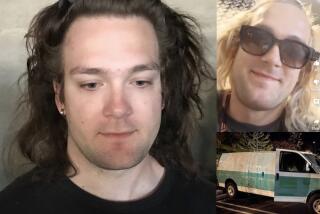Tense City Seeks a Catharsis in Funeral for Black Officer
PROVIDENCE, R.I. — Sadness mixed with tension as this seaside state capital prepared to bury a 29-year-old black police officer shot to death over the weekend by two white fellow officers.
With 5,000 police officers expected from around the country, city leaders expressed hope that today’s funeral for Sgt. Cornel Young Jr. would help ease racial strains that were mounting even before Young was killed Saturday.
“What we’re trying to do right now,” said Clifford Monteiro, executive director of the local chapter of the NAACP, “is keep the lid on everything.”
Young, the son of the city’s highest-ranking African American police officer, was killed during a confrontation with an armed man outside a restaurant. Off-duty and grabbing a late-night meal at Fidas in the Federal Hill district, Young was not in uniform when he drew his gun to help subdue a man brandishing a weapon, 30-year-old Arnold Diaz.
Young was shot at least twice after he failed to respond when officers Carlos Saraiva and Michael Solitro III ordered him to drop his gun, authorities said. Saraiva and Solitro say they did not recognize Young as a police officer. It is unclear whether Young identified himself.
A state grand jury will soon investigate the shooting. Although he dropped his weapon when ordered to do so by police, Diaz has been charged with murder under a felony murder statute, as well as assault with a deadly weapon.
Police headquarters was draped in black bunting, and flags flew at half-staff throughout the city. Gov. Lincoln Almond canceled Tuesday’s State of the State address so mourners could attend Young’s wake, and the mayor urged city workers to stop work during today’s funeral.
Young was one of 33 African Americans in a 470-member force. Young and Saraiva graduated from the same class of 25 aspiring officers. “There is something inherently wrong with our society when classmates cannot recognize each other,” said the Rev. Marlowe Washington of the Allen A.M.E. Church.
But Mayor Vincent “Buddy” Cianci Jr. hastened to quell speculation that race was a factor in Young’s death. “I don’t think there are any racial overtones that I can see at the particular time. The tragedy is we have two officers who certainly in my opinion didn’t intentionally mean to kill a brother officer,” the mayor told reporters.
He called Young’s death a case of mistaken identity that took place “in an adrenaline-charged atmosphere where a split-second decision was made.”
Monteiro, himself a former city police officer, noted in an interview that Young was killed a time when the subject of race was close to the surface. Just two days earlier, more than 50 community groups gathered at the Capitol for a heated discussion of racial profiling. “Providence has historically been a hotbed of racial unrest,” he said of this city of 160,000 with a minority population of about 40%.
While some of the city’s blacks were describing Young’s death as an assassination, Monteiro said he hoped the funeral would provide a pause for thoughts of unity.
“I’m hoping that the people who are white and believe they belong to a private club in the human race will be able to open the doors of that private club and make it a public club, and say we all need to sit down together,” Monteiro said.
Police Maj. Cornel Young Sr., head of the community service division of the city’s police force, called for calm while investigators look into his son’s death.
The case comes as police conduct in Los Angeles, New York and elsewhere has drawn heightened scrutiny. James Alan Fox, a professor of criminal justice at Boston’s Northeastern University, said police forces are being held to increasingly higher standards, in part because crime rates are at a 30-year low.
“When crime rates were high, the police were given a mandate to lower crime rates at all costs--just do it,” Fox said. Now people are “fussier and pickier--scrutinizing the ways in which police do their jobs. They want police not only to fight crime, but to do it in an ethical, fair way,” Fox said.
Days after his death, as a tribute, Young was promoted to sergeant.
More to Read
Sign up for Essential California
The most important California stories and recommendations in your inbox every morning.
You may occasionally receive promotional content from the Los Angeles Times.









